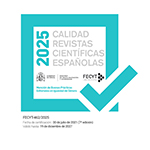Francisco de Imperial “reading” the Divine "Comedy": el "Dezir de las siete virtudes" and its (meta)poetic and political legacy
Abstract
The aim of this paper is to analyze Francisco de Imperial’s masterpiece, the decir narrativo en arte mayor known as “Dezir de las siete virtudes”, paying special attention to those elements that have determined the course of the allegorical-Dantesque school. On the one hand, we will focus on the metapoetic framework of this new allegorical journey, which is configured using the mise en abyme technique. On the other hand, we will focus on its allegorical and political framework, which, inspired in Dantesque prophetic format and its obscutitas, allows us to place the new fiction upon the 15th Century’s Castilian historical and political context. Both aspects of this text are essential to understand not only the poetics of Imperial’s principal successor, the Marqués de Santillana, but also the main characteristics of the allegorical-Dantesque school the Marqués inaugurates.
Downloads
Article download
License
In order to support the global exchange of knowledge, the journal Dicenda. Cuadernos de Filología Hispánica is allowing unrestricted access to its content as from its publication in this electronic edition, and as such it is an open-access journal. The originals published in this journal are the property of the Complutense University of Madrid and any reproduction thereof in full or in part must cite the source. All content is distributed under a Creative Commons Attribution 4.0 use and distribution licence (CC BY 4.0). This circumstance must be expressly stated in these terms where necessary. You can view the summary and the complete legal text of the licence.









